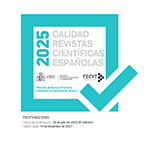Fact-checking against disinformation: learning to reframe in the classroom and in journalistic writing
Abstract
Disinformation campaigns in the public sphere are generating deep institutional and academic concern for their adverse effects on democratic health: they provoke a climate of distrust, social polarization and block public debate. In this context, this article aims to contribute to the incorporation of the findings of the Frame Theory in teaching and journalistic practice. The analysis of 135 verification news items related to the Fact Checking Coalition Objectif Desinfox, during the pre-election environment and election campaign of the 2022 French presidential elections, allows us to explore the degree to which the findings of this theory are incorporated into the most specialized news pieces on disinformation. Results show that three out of four news items keep the frame of the disinformation piece and do not show who is responsible for the lie and why. This article also offers guidelines to improve news writing.
Downloads
Article download
License
In order to support the global exchange of knowledge, the journal Estudios sobre el Mensaje Periodístico is allowing unrestricted access to its content as from its publication in this electronic edition, and as such it is an open-access journal. The originals published in this journal are the property of the Complutense University of Madrid and any reproduction thereof in full or in part must cite the source. All content is distributed under a Creative Commons Attribution 4.0 use and distribution licence (CC BY 4.0). This circumstance must be expressly stated in these terms where necessary. You can view the summary and the complete legal text of the licence.










